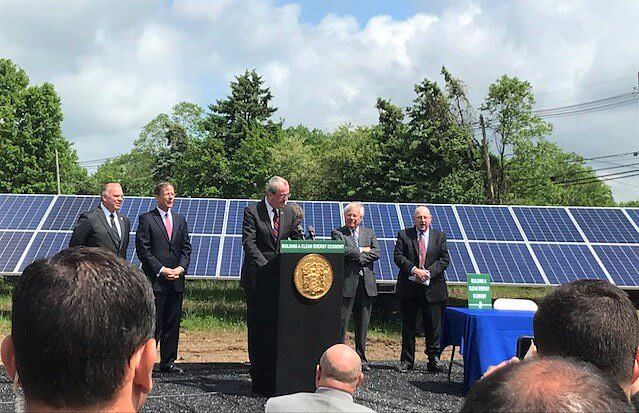Solar and other clean energy groups are applauding the passage of a New Jersey bill they say will revive the renewable energy industry in the state.
Today, surrounded by solar energy advocates, Gov. Phil Murphy, D-N.J., signed a historic bill, A.3723, to significantly advance New Jersey’s clean energy economy. Vote Solar, Earthjustice, the Coalition for Community Solar Access (CCSA), the Solar Energy Industries Association (SEIA) and Sunrun are among many organizations that have been strong advocates for the legislation.
According to the groups, if properly implemented, the bill will stabilize and expand New Jersey’s renewable energy sector and help extend the cost-saving benefits of solar to more families, communities and businesses in the state through the establishment of a community solar program. In recent weeks, lawmakers also heard from thousands of New Jersey voters and residents calling for support of today’s legislation.
The groups say the legislation will stabilize the solar market through 2021 by increasing the solar target, closing the current solar renewable energy credit trading program in an orderly way, reducing the overall cost of the current solar renewable portfolio standard (RPS) by lowering the Solar Alternative Compliance Payment, and setting in motion a process for establishing the next generation of solar programs in the Garden State.
According to the governor, the bill takes several other critical steps to improve and expand New Jersey’s renewable energy programs:
- RPS: This requires 21% of the energy sold in the state be from Class I renewable energy sources by 2020, 35% by 2025 and 50% by 2030. A cap on costs provides additional protections for consumers.
- Offshore Wind: The bill codifies the governor’s goal of 3.6 GW of offshore wind by 2030. It also reinstates an expired program to provide tax credits for offshore wind manufacturing activities.
- Energy Efficiency: This requires each utility to implement energy efficiency measures to reduce electricity usage by 2% and natural gas usage by 0.75%.
- Energy Storage: This provision codifies the governor’s goal of achieving 600 MW of energy storage by 2021 and 2,000 MW by 2030.
“Today, we’re taking another step forward in rebuilding New Jersey’s reputation as a leader in the development of clean energy sources while fulfilling a critical promise to foster our state’s energy future,” says Murphy. “Signing these measures represents a down payment to the people of New Jersey on the clean energy agenda I set forth at the beginning of my administration – a plan that will always consider the best interests of our residents and our environment while growing our economy.”
With the signing of the bill, New Jersey will become the 18th state to enable community solar, which, if properly implemented by the board of public utilities, will ensure that all New Jerseyans have access to solar energy, the clean energy groups explain. The community solar program will give consideration to residential customers, especially in multifamily buildings, and low- to moderate-income customers.
“It has never been more important for leaders to stand up for clean energy jobs, local investments, and clean air and climate progress in our communities. We are encouraged that in the face of rollbacks in Washington, Governor Murphy is stepping up with bold action,” says Pari Kasotia, Mid-Atlantic director for Vote Solar. “Americans across the political spectrum overwhelmingly support solar progress. We urge lawmakers to look to New Jersey’s leadership to spur the clean energy economy.”
“The solar industry appreciates Gov. Murphy’s leadership,” adds Sean Gallagher, SEIA’s vice president of state affairs. “By signing this bill into law, many more New Jersey residents, businesses and communities will have access to solar energy. This is a huge win for customers, will support the thousands of solar jobs in the Garden State, and puts the state on track to meeting its ambitious clean energy goals.”
“The New Jersey legislature and Governor Murphy should be applauded for passing community solar legislation and recognizing the increased consumer demand for solar energy. If properly implemented, this legislation will create access to solar energy for consumers and businesses across New Jersey for the first time,” notes Brandon Smithwood, policy director for CCSA. “We look forward to working with the New Jersey Board of Public Utilities to create a robust program that enables hundreds of thousands of consumers across the state to choose community solar and save money on their electric bills.”
Today, Murphy also signed a bill to establish a zero-emissions certificate (ZEC) program to maintain New Jersey’s nuclear energy supply, which contributes close to 40% of the state’s electric capacity. Plants seeking to participate in the program would be required, among other things, to demonstrate that they make a significant contribution to New Jersey air quality and that they are at risk of closure within three years. The new law gives the Board of Public Utilities broad latitude to engage outside experts to analyze nuclear power plant financial information and applications and to adjust ZEC payments as necessary to meet a plant’s actual financial need.
In addition, Murphy signed Executive Order No. 28, directing state agencies to develop an updated energy master plan (EMP) that provides a path to 100% clean energy by 2050. The new EMP is to be completed and delivered by June 1, 2019, and will provide a blueprint for the total conversion of the state’s energy production profile to 100% clean energy sources by Jan. 1, 2050. The EMP will integrate the programs established in these bills and will facilitate the implementation of Executive Order No. 8, establishing the Offshore Wind Strategic Plan.
Underscoring the economic benefits of clean energy programs, Murphy also announced Atlantic City Electric’s (ACE) $6.5 million workforce development initiative, which will provide funds to expand clean energy job training and workforce development efforts to help improve employment in ACE’s southern New Jersey service area. These programs will include Get Into Energy Math Test and Boot Camp; Women in Sustainable Employment (WISE)-Pathway; ACE Line School; High School Energy Career Academy; and County Driven Initiatives.
“Creating energy jobs of the future is critical to growing New Jersey’s economy,” added Murphy. “I applaud Atlantic City Electric for their workforce development efforts to train the next generation to seize the opportunity of the clean energy economy. I thank Atlantic City Electric for its long-range view and look forward to working alongside them to grow our energy economy together.”




